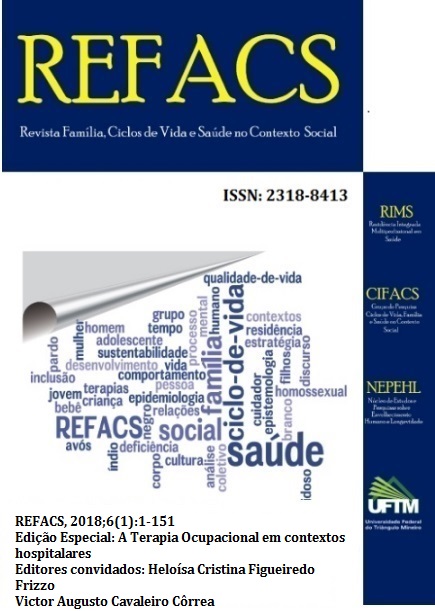Diagnóstico situacional e intervenções de terapia ocupacional em unidade de terapia intensiva onco-hematológica pediátrica
DOI:
https://doi.org/10.18554/refacs.v6i1.1949Palavras-chave:
Terapia ocupacional, Unidades de terapia intensiva pediátrica, Serviço Hospitalar de OncologiaResumo
O objetivo deste estudo foi traçar o diagnóstico situacional de uma Unidade de Terapia Intensiva Onco-hematológica Pediátrica (UTIOP) e verificar as possíveis intervenções de Terapia Ocupacional (TO). Este é um relato de experiência retrospectivo e descritivo, realizado em 2014 considerando o período de quatro meses após a inserção da TO na UTIOP de um Hospital terciário da cidade de São Paulo. A partir da compreensão do perfil dos pacientes e da dinâmica da Unidade, foi possível a elaboração de um instrumento de avaliação. Para o período a TO atendeu 25 de 29 crianças internadas, com predominância de idade de até 7 anos e diagnóstico de leucemia, com a condição de internação de consciente ou sedado e tempo de internação de até 7 dias. A TO realizou 97 intervenções: avaliação, orientações aos cuidadores, posicionamento no leito, Tecnologia Assistiva. A partir da experiência clínica pode se afirmar que o TO possui competência para intervir junto aos pacientes e seus familiares no espaço da Unidade de Terapia Intensiva Pediátrica e Oncológica, contribuindo significativamente com a equipe multiprofissional e na qualidade de vida dos pacientes/cuidadores assistidos.
Referências
Instituto Nacional de Câncer “José Alencar Gomes da Silva”, Coordenação de Prevenção e Vigilância. Estimativa 2016: incidência de câncer no Brasil. Rio de Janeiro: INCA; 2015. 122p.
Instituto Nacional de Câncer “José Alencar Gomes da Silva”, Coordenação de Prevenção e Vigilância de Câncer. Câncer da criança e adolescente no Brasil: dados dos registros de base populacional e de mortalidade. Rio de Janeiro: INCA; 2008. 220 p.
Franco MP, Kudo AM. Intervenção de terapia ocupacional em unidade de terapia intensiva pediátrica. In: De Carlo MMRP, Kudo AM, organizadores. Terapia ocupacional em contextos hospitalares e cuidados paliativos. São Paulo: Payá; 2017. (no prelo).
Fernandes HS, Silva E, Capone Neto A, Pimenta LA, Knobel E. Gestão em terapia intensiva: conceitos e inovações. Rev Bras Clin Med. 2011; 9(2):129-379.
Agência Nacional de Vigilância Sanitária. Resolução RDC nº 7, de 24 de fevereiro de 2010. Dispõe sobre os requisitos mínimos para funcionamento de Unidades de Terapia Intensiva e dá outras providências. D.O.U., Brasília, 25 fev 2010
Disponível em: http://bvsms.saude.gov.br/bvs/saudelegis/anvisa/2010/res0007_24_02_2010.html.
Albuquerque VB. Atuação do terapeuta ocupacional em unidade de terapia intensiva pediátrica junto ao paciente e à família: relato de caso. Rev Saúde Criança Adolesc. 2011; 3(1):63-5.
Bigatao MR, Mastroprieto AP, Carlo MMRP. Terapia ocupacional em oncologia: a experiência do Hospital das Clínicas da Faculdade de Medicina de Ribeirão Preto da Universidade de São Paulo. In: Othero MB., organizador. Terapia ocupacional: práticas em oncologia. São Paulo: Roca; 2009. p. 302-322.
Kudo AM, Souza FDA, Franco MP, Bullara P, Barros PBM. Cuidados paliativos em pediatria e o impacto da hospitalização no quotidiano da criança e do adolescente com doença crónica. In: Costa A, Othero MB. Reabilitação em cuidados paliativos. Loures, Portugal: Lusodidacta; 2014. p.289-301.
Instituto Nacional de Câncer “José Alencar Gomes da Silva”. Câncer infanto-juvenil é tema do Dia Mundial do Câncer 2017 [Internet). Rio de Janeiro: INCA; 2017 [citado em 02 fev 2017]. Disponível em: http://www2.inca.gov.br/wps/wcm/connect/agencianoticias/site/home/noticias/2017/cancer_infanto-juvenil e tema do dia mundial docancer_2017.
Afflek AT, Lieberman S, Polon J, Rohrkemper K. Providing occupational therapy in an intensive care unit. Am J Occup Ther. 1986; 40:323-32.
Bombarda TB, Lanza AL, Santos CAV, Joaquim RHT. Terapia ocupacional na unidade de terapia intensiva (UTI) adulto e as percepções da equipe. Cad Ter Ocup UFSCar. 2016; 24(4):827-35.
Alvarez E, Garrido M, González F, Guzmán E, Donoso T, Gallegos S, et al. Terapia ocupacional precoz e intensiva en la prevención del delirium en adultos mayores ingresados a unidades de paciente crítico: ensayo clínico randomizado: resultados preliminares. Rev Chilena Ter Ocup. 2012; 12(1):45-58.
Presidência da República (Brasil). Lei nº 8.069 de 13 de julho de 1990. Dispõe sobre o Estatuto da Criança e do Adolescente e dá outras providências [Internet]. D.O.U., Brasília, DF, 16 jul 1990 [citado em 23 jan 2014].
Disponível em: http://www.planalto.gov.br/ccivil_03/LEIS/L8069.htm.
Silva FR, Ballarin MLGS, Oliveira JC. Grupo de acompanhantes de crianças internadas em unidade de terapia intensiva. Cad Ter Ocup UFSCar. 2015; 23(4):871-7.
Associação Americana de Terapia Ocupacional. Estrutura da prática da terapia ocupacional: domínio e processo. Cavalcanti A, Dutra FCMS, Elui VMC, tradutores. Rev Ter Ocup. 2015; 26(ed esp.):1-49.
Downloads
Publicado
Edição
Seção
Licença
Este trabalho está licenciado sob uma licença Creative Commons Attribution-NonCommercial 4.0 International License.



